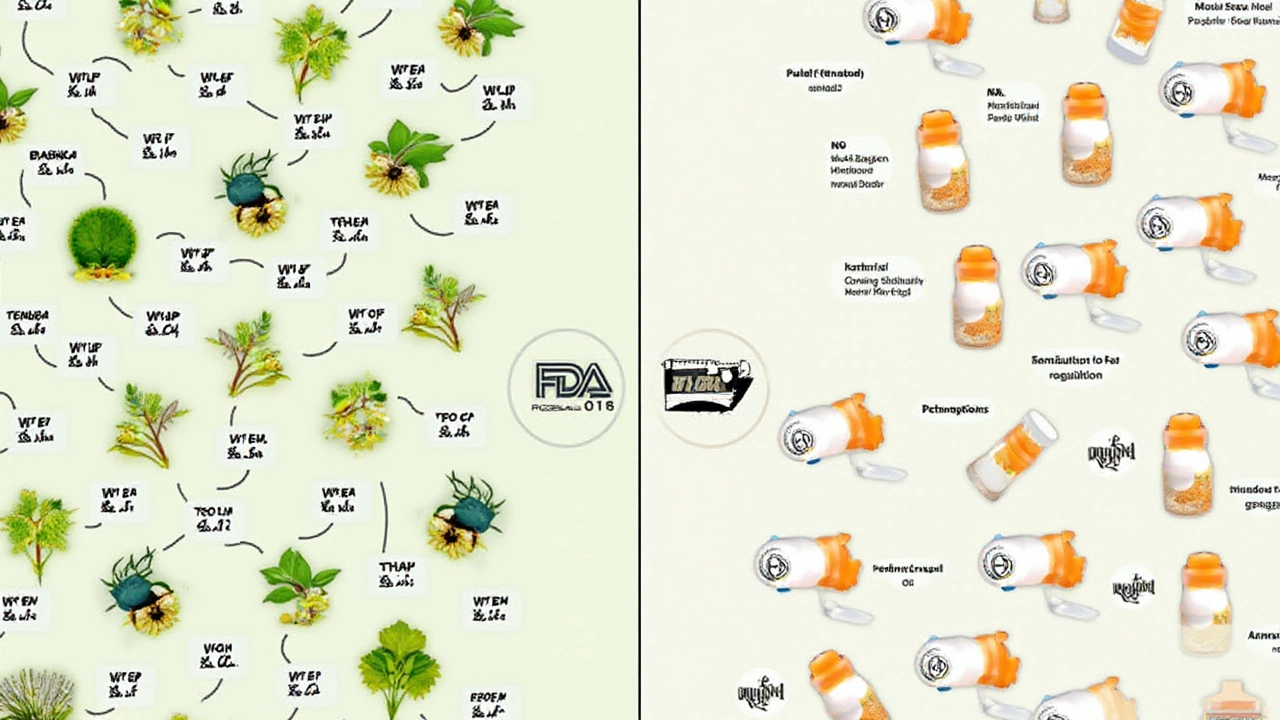
In recent years, the use of herbal supplements has surged as individuals seek natural ways to support their health. Unlike conventional medications, herbal supplements occupy a unique space in the realm of healthcare, often leaving consumers confused about their regulatory status.
The U.S. Food and Drug Administration (FDA) plays a significant role in ensuring that these products are safe for the general public, but it operates differently than many might expect. It's important to grasp how these dynamics work and what it means for your health and safety.
This article will guide you through the essential aspects of herbal supplement regulation, helping you to better understand the difference between these botanical products and typical prescription drugs. By equipping yourself with this knowledge, you can make more informed choices on your journey toward wellness.
- Herbal Supplements vs. Medications
- FDA's Role and Regulations
- Safety and Efficacy Considerations
- Tips for Consumers
- Future Trends in Regulation
Herbal Supplements vs. Medications
Understanding the difference between herbal supplements and prescription medications is crucial for anyone considering adding a natural remedy to their health regimen. At the core, herbal supplements are classified as dietary supplements by the FDA, which means they are not subjected to the same rigorous testing processes as pharmaceutical drugs. Prescription medications undergo extensive clinical trials to ensure their safety and efficacy before reaching the market. These tests often take several years and involve thousands of participants before the FDA gives the green light.
On the flip side, herbal supplements, such as St. John's Wort or Echinacea, can hit the shelves without any pre-market approval from the FDA. This lack of stringent testing means that the claims made by supplement manufacturers don't always have to be backed by scientific evidence. While this system allows for more freedom in the marketplace, it also places the burden of proof on consumers and healthcare providers to verify the effectiveness and safety of these products. It's important to consult reliable sources of information and, when possible, medical professionals before starting any new supplement.
Moreover, consumers should be wary of the potential for interactions between herbal supplements and prescription medications. These interactions can sometimes lead to serious side effects, decreasing the efficacy of prescription drugs or increasing the risk of adverse reactions. For instance, Ginkgo biloba, a supplement often used to improve memory, can increase bleeding risk if taken with blood thinners. This highlights the need for consumers to communicate openly with their healthcare providers about any and all supplements they are taking. A quote from a renowned source encapsulates this well:
"Before you take any new natural remedies, it is crucial to engage in a discussion about it with your healthcare provider to avoid unexpected interactions," advises Dr. Jane Peterson, Director of the Herbal Medicine Institute.
Another layer of complexity comes from the manufacturing and labeling standards for herbal supplements. Unlike medications, these products may not consistently contain the specified levels of active ingredients due to less stringent regulatory oversight. This variability can affect the potency and effectiveness of the supplement. A study from the Journal of Nutrition found that nearly 25% of herbal supplements tested did not contain the listed dosage. This statistic emphasizes the need for choosing products from reputable companies that adhere to Good Manufacturing Practices (GMP).
In conclusion, while herbal supplements can offer benefits and are embraced by many for their natural origin, understanding their differences from prescription medications can empower consumers to make safer, healthier choices. These natural products tread a fine line between traditional herbal medicine and modern medical skepticism, making consumer education especially important in navigating this thriving industry.
FDA's Role and Regulations
The U.S. Food and Drug Administration (FDA) is a pivotal organization when it comes to safeguarding public health, yet its approach to herbal supplements differs from its regulation of pharmaceuticals. These dietary supplements are, intriguingly, not subject to the same stringent scrutiny that prescription drugs endure. This regulatory framework traces back to the Dietary Supplement Health and Education Act (DSHEA) of 1994, which classifies supplements more like food rather than drugs. What this means is that manufacturers are responsible for ensuring the safety of their products before they hit the shelves. However, the FDA does not approve these supplements for safety or effectiveness before they are marketed.
The agency’s involvement predominantly kicks in post-marketing. If, after a product is made available to consumers, there are reports of adverse effects or safety concerns – that’s when the FDA might take action. They can then issue warnings, or in extreme cases, force a recall. This might sound alarming, but it does allow the supplements to be available more readily while still maintaining a safety net. Despite these measures, consumers often grapple with questions about the relative safety and reliability of these natural remedies. Manufacturers are expected to follow 'Good Manufacturing Practices,' and they must label products correctly, providing accurate ingredient lists and health claims.
Interestingly, concerns about the efficacy and safety of herbal supplements aren't new. The regulatory landscape is constantly evolving, and the FDA has been known to refine its approaches. Dr. Janet Woodcock, former director of the FDA's Center for Drug Evaluation, once remarked,
"Our objective is the safe consumption of supplements, empowering consumers with the right information to make healthy choices."This quote underscores the balanced approach the FDA endeavors to strike between consumer access and safety.
Importantly, claims made by these products on their packaging or advertising cannot state that they cure, treat, or prevent diseases. They can, however, discuss the role of nutrients in supporting normal body functions. For those curious, careful reading of these labels is essential, and understanding how to interpret them can play a crucial role in navigating the often-confusing supplements market. For instance, if a label mentions a product helps to improve immunity, it's a generalized claim allowed by the FDA, and not a guarantee of curing diseases.
As public interest in herbal solutions grows, there's a potential shift on the horizon regarding how the FDA may increase its oversight. Some advocate for a more involved pre-approval process akin to that imposed on drugs, citing safety concerns and instances of adulterated products, while others value the current accessibility. As it stands, staying informed and considering professional advice when incorporating herbs into health routines remain invaluable strategies for consumers navigating today’s supplement landscape.

Safety and Efficacy Considerations
When it comes to assessing the safety and efficacy of herbal supplements, the landscape can be quite convoluted. Unlike pharmaceutical drugs that undergo rigorous testing and clinical trials before hitting the market, herbal supplements are not required by the FDA to prove their effectiveness or safety before they are sold. This is primarily because they are categorized as food products rather than drugs. This unique categorization places the onus on manufacturers to ensure their products are safe and accurately labeled, whereas the FDA can intervene only after they reach the market if issues arise.
The lack of mandatory pre-market evaluation means consumers need to be vigilant in terms of what they're ingesting. It is crucial to conduct thorough research, including reading scientific studies, consulting healthcare providers, and looking for third-party certifications that may indicate a higher degree of quality control. For example, the USP Verified mark is one indicator that a product has been reviewed for purity and potency. It is estimated that nearly 80% of the world’s population utilizes herbal medicine as part of their primary healthcare, emphasizing the need for informed decisions.
Potential Risks and Interactions
Herbal supplements are often perceived as being devoid of side effects due to their natural origins. However, this is a misconception which can sometimes lead to detrimental outcomes. Many herbs can interact with prescription medications, resulting in either diminished drug efficacy or enhanced side effects. For instance, St. John’s Wort is known to reduce the effectiveness of certain medications such as antidepressants and birth control pills. Such interactions may not always be explicitly listed on the supplement label, underscoring the importance of consulting healthcare professionals.
"Consumers often assume that ‘natural’ equates to ‘safe’. It's crucial for individuals to be cautious when combining herbs with prescribed medications." – National Center for Complementary and Integrative Health
Adverse reactions are another area of concern. Some supplements, although beneficial in moderate doses, can be toxic if consumed excessively. For instance, kava, used traditionally for its calming effects, has been linked to serious liver damage when taken in high concentrations. The herbs can also affect surgical outcomes, by either thinning the blood or interacting with anesthesia. As such, it's recommended that users disclose all supplements to their healthcare providers, especially before surgeries.
| Herb | Possible Interactions | Potential Side Effects |
|---|---|---|
| St. John's Wort | Antidepressants, Birth Control | Photosensitivity, Anxiety |
| Kava | Sedatives | Liver Damage, Drowsiness |
| Ginkgo Biloba | Blood Thinners | Increased Bleeding Risk |
Taking these considerations into account, it is paramount for consumers to maintain open communication with their healthcare providers. Understanding the potential implications can help mitigate risks, ultimately allowing for the safe incorporation of herbal supplements into a comprehensive approach to health.
Tips for Consumers
When navigating the vast world of herbal supplements, making informed choices is key to optimizing your health without falling victim to misleading claims. First and foremost, it is critical to research the products you are considering. Study their safety and efficacy through trusted sources, such as scientific studies or reputable health organizations. Don't rely solely on the company’s marketing materials, which can be biased.
Look for supplements that have been tested by third-party organizations like the U.S. Pharmacopeia or NSF International. Their seals indicate that the product meets specific quality standards and is free from harmful contaminants. Moreover, supplements should be labeled clearly, listing all ingredients and their respective amounts. Be cautious with blends, as sometimes the exact quantity of each herb might not be disclosed.
"Be wary of products that claim to treat, diagnose, or cure diseases. These are red flags as the FDA doesn’t allow dietary supplements to make such claims," advises Dr. John Smith, a pharmacology expert from Harvard Medical School.
Interaction with current medications is another crucial consideration. Talk to healthcare providers to make sure that the chosen supplements won't negatively interact with prescriptions you might be taking. Some herbs can have powerful effects that might compound or inhibit the action of pharmaceutical drugs.
If you’re trying to address specific health issues with natural remedies, document your experiences with these supplements meticulously. Jot down any side effects or improvements in your health. This kind of information is invaluable when discussing treatment plans with professionals, providing a better picture of what works for you.
Remember that natural doesn’t automatically equate to safe, especially in large quantities. Start with the recommended dosage on the label, and monitor how your body responds. Common sense is your ally; if something seems too good to be true, it likely is. The supplement market can have its wild west aspects, where not every product is worth the investment.
In an era where natural products are booming, using these strategies will help you sidestep the potential pitfalls in the market. Empowering yourself with knowledge is the best way to ensure that you are truly benefiting from herbal supplements.

Future Trends in Regulation
As the interest in herbal supplements continues to grow, so does the complexity of their regulation. The FDA has taken a more proactive stance to ensure that these products are safe and effective for consumers. One of the promising trends is the integration of advanced technology in monitoring quality control. This includes blockchain technology which could provide transparent tracking of supplement ingredients from the point of origin to the consumer's shelf. This not only helps in verifying authenticity but also enhances consumer confidence in these products. Additionally, the use of advanced analytics can detect potential contaminants at microscopic levels, improving safety standards across the board.
Another forthcoming trend is the global harmonization of dietary supplement regulations. As markets become more international, aligning standards could reduce confusion and discrepancies in safety regulations across countries. This movement is primarily spearheaded by international collaborations that draw from regional regulatory successes and failures. By adopting a more united approach, manufacturers and regulators can streamline the process of approving supplements while ensuring they meet the highest safety criteria. As a result, this harmonized approach could lead to a new era of trust and reliability in the herbal supplement industry.
"With the rise of global commerce in herbal supplements, there is an urgency to develop regulatory frameworks that transcend national borders," says a senior analyst at the World Health Organization. "Such frameworks could ease the transition towards stricter, yet more effective standards that protect consumer interests without stifling innovation."
The push for more rigorous post-market surveillance is gaining momentum as well. The FDA and similar agencies are increasingly relying on real-world data and digital health technologies to monitor the adverse effects of supplements after they hit the market. This retrospective approach allows for dynamic tracking and rapid response to safety concerns, potentially averting public health issues before they escalate. Such advancements in regulation not only benefit public health but also set a precedent for accountability within the industry.
Lastly, there's a growing emphasis on consumer education as a regulatory focus. Empowering consumers with knowledge about the ingredients, sourcing, and effects of herbal supplements can lead to more informed purchasing decisions. This entails improving labeling requirements to ensure clarity and accuracy. Digital platforms and mobile applications are also gradually emerging as tools to provide consumers with instant access to data about the supplements they are considering. With technological innovation at the forefront, the future of supplement regulation looks promising, poised to offer a more secure and transparent experience for consumers worldwide.

Write a comment